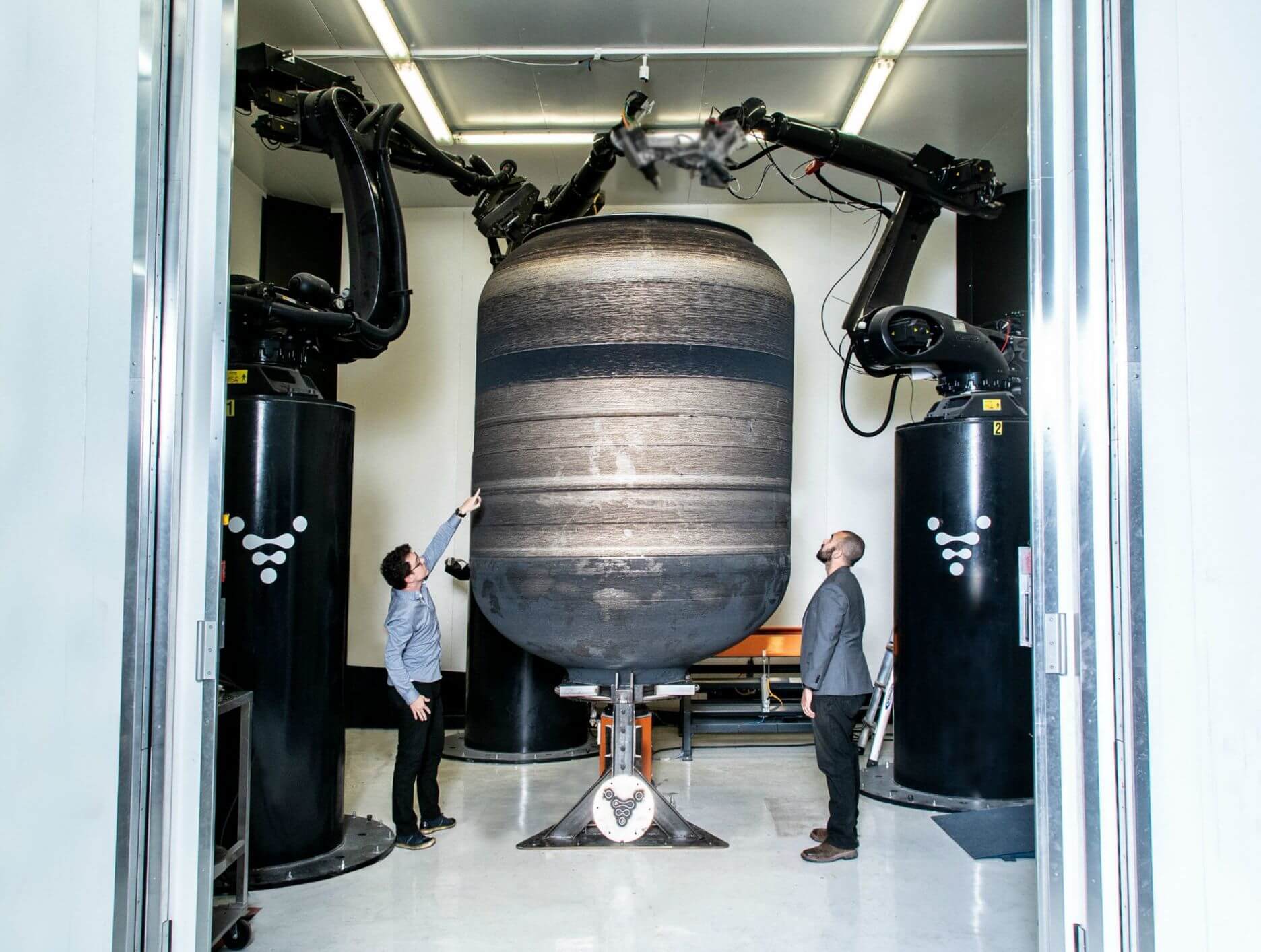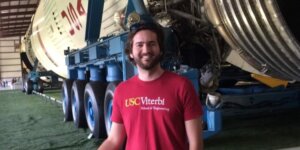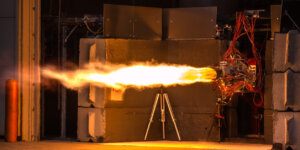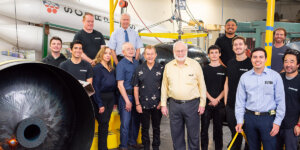
Relativity Space is the first company to use 3-D printers to build entire rockets. Photo courtesy of Relativity Space.
Tim Ellis started college as an undecided-major at USC. Today, the 2012 aerospace engineering alum is revolutionizing the spacecraft manufacturing industry by 3-D printing rockets that may one day take human beings to Mars.
Ellis, who is the co-founder of Relativity Space, an aerospace manufacturing company employing groundbreaking strategies in spacecraft production, has developed a massive 3-D metal printer that manufactures rockets in an unparalleled time and cost frame, using machine learning and the latest in automation processes. His company, most uniquely, is among the first of its kind to 3-D print whole commercial products.
This year, his work earned him a place in MIT Technology Review’s “35 Innovators Under 35,” a selective list of global pioneers altering the landscape of technological innovation.
“USC Viterbi has had great success in TR 35 in recent years,” said Dean Yannis Yortsos, USC Viterbi Dean. “Since 2009, had 12 winners, 8 of which were women. Last year, for the first time, one of our Ph.D. students earned a place in the MIT TR 35 and this year, an alum, Tim Ellis.”
Staying true to his mission to change the world, Ellis holds firm to one long-term goal, both for himself and his company.
“We’re going to 3-D print the first rocket made on Mars,” he said.
The Origin Story
Growing up in Plano, Texas, Ellis developed an early passion for film and writing, spending his free time filming homemade zombie movies with friends. Upon being admitted to USC’s Thematic Option program, he set his sights on becoming a screenwriter. Space exploration and rocket design never quite captured his attention until the start of his sophomore year at USC.
“I joined a student group after my freshman year called the USC Rocket Propulsion Lab,” said Ellis, reminiscing on one of his most cherished student experiences. “I wasn’t very excited about aerospace after my freshman year because planes always felt like a solved problem.”
Following a trip to the Mojave Desert, the testing ground for USC RPL’s rockets, Ellis witnessed his first engine test.
“I was absorbed,” he said. “Because of that experience, this is the advice I give to students: get involved in hands-on projects. It just makes school more valuable because it gives you context, and you finally understand why you’re learning that differential equation, that circuit diagram, or that software line of code.”
Around that time, he met Jordan Noone, ‘14 aerospace engineering, his future co-founder in Relativity Space and the company’s current CTO. Their drive and energy helped forge an ambitious friendship at the heart of their shared affinity for rockets.
Ellis’ own success at RPL brought him to the fore of three consecutive internship positions with Blue Origin, a private space exploration company founded by Amazon CEO Jeff Bezos.
“I was tasked with moving from a blank sheet of paper to a fully working product,” Ellis recalled. “I’d have to do all of it: learning, design, analysis, manufacturing, assemblage and testing, all in a very fast time frame.” He eventually became a full-time employee at Blue Origin for two years, creating the company’s first metal 3-D printing program.
“I spent nights and weekends working on this program because it wasn’t my main job and no one asked me to do it,” Ellis said. “But I was just very possessed with this idea that 3-D printing was going to be the future of rocket manufacturing.”
Everything is Relativity
Ellis shared Elon Musk’s vision of enabling humanity to become a truly interplanetary species. To create a company that broadly aspired to make humans multi-planetary, he left Blue Origin to start Relativity, alongside former RPL colleague, Noone, who was working for Space-X at the time.
“I would say relentlessness is the most important skill-set I’ve learned.”
Tim Ellis
The company’s core mission, to 3-D print the first rocket made on Mars, was more than just an attention-drawing concept within the aerospace industry’s greater context. As companies like Space X and Blue Origin sought to launch humans to Mars, Ellis wanted to launch the machinery that would build everything needed to sustain the eventual colonization of the planet.
“Within a week, I decided to cold email Mark Cuban for a starting investment, typing every possible email address he could have,” Ellis said. “I sent him a message, and within five minutes he replied, saying he would give us half a million dollars.”

Tim Ellis came in as an undecided major and now runs an aerospace manufacturing company on course to launch rockets to Mars. Photo courtesy of Tim Ellis
That same week, Ellis applied to Y-Combinator, a universally renowned start-up accelerator associated with the success and early development of companies like Reddit, DropBox, and Airbnb.
These initial triumphs may have been a testament to Relativity Space’s immense potential, but even Ellis is quick to admit this sort of introduction remains an anomaly in the start-up world. Every part of the process thereafter proved a tremendous challenge.
“I would say relentlessness is the most important skill-set I’ve learned,” Ellis said, reflecting on the seemingly endless stream of hurdles he encounters as Relativity CEO. “To me, relentlessness is the number-one indicator of success. You might reach out to 100 people and hear ‘no’ 99 times, but you only need one ‘yes,’ because that one ‘yes’ can get you 15 million dollars.”
Back to The Present
Today, Relativity Space has grown to 96 employees, raising over 45 million dollars in investment funds and closing hundreds of millions of dollars’ worth of U.S. government infrastructure partnerships. The company has acquired exclusive access to distinguished launch sites, NASA testing sites and the Stennis Space Center, among others.
“I believe what we are doing is inevitable,” Ellis said. “I don’t see a future where, in 50 years, rockets are not 3-D printed. It just wouldn’t make sense because it is so fundamentally faster and cheaper. We know we need 3-D printing to manufacture stuff on other planets.”
Relativity Space is now on track for its first orbital launch in less than two years from the company’s launch site in Cape Canaveral, Florida.
“That’s going to be a huge milestone, not just for the company, but for the world,” Ellis said. “It’ll be the first time an entirely 3-D printed product is flown to space. It’s a coming-of-age story for 3-D printing.”
Published on August 23rd, 2019
Last updated on April 8th, 2021













